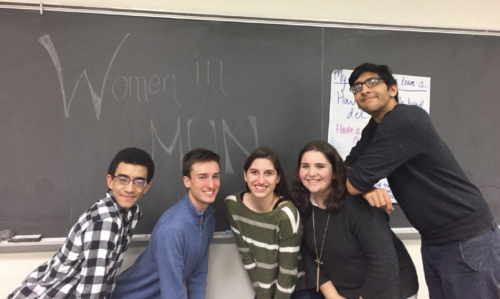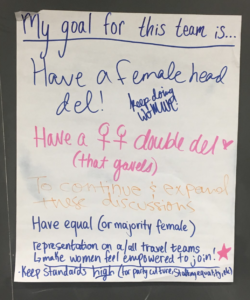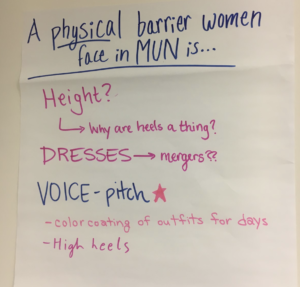
Freshmen on Georgetown’s team attending a Women in MUN session in 2017
In 2016, a senior on Georgetown’ University’s Model United Nations team, Yasmin Faruki, began a series of discussion about gender and Model UN, which would grow into a larger, year-round program. According to Yasmin, “we started Women in MUN because I felt there was a lack of a dialogue to speak freely about gender-specific dynamics on the circuit. The idea was to create an informal space where people could take off their formal speech training and speak candidly about their experiences. In doing so, we hoped to raise awareness and also push boundaries on other dynamics that felt taboo to talk about— including race and privilege.”
For Georgetown’s team, small group conversations are vital. These roundtables consist of three components: sharing stories, asking questions, and discussing solutions. While it is largely conversational, there has also been success in brainstorming activities and panels with experienced female delegates.

Brainstorming poster from a Women in MUN session
The team now regularly hosts these conversations, and is expanding the program to work alongside American University and George Washington University. Team members have committed to calling out gender inequality on the circuit and improving issues within their own team.
While there is still a ways to go, Georgetown’s model can be implemented to help empower women on your team. Here are a few do’s and don’ts for hosting your own conversations, based on the Georgetown program’s successes and failures!
- Do set clear guidelines. It’s vital for everyone to be on the same page, understanding goals for the conversation and promising to be respectful of others.
- Don’t invalidate others’ experiences. Individuals may have had vastly different experiences. Everyone must feel welcome to share, and responses like “your experience was an exception” will shut this down.
- Do push yourself. These conversations are uncomfortable by nature. One guideline that can be set is the stoplight system. Green is totally comfortable, yellow is uncomfortable, and red is unsafe. Encourage participants to push themselves to yellow, but to speak up or take a break if they reach red. This will encourage honesty and vulnerability, while remaining productive.
- Don’t be accusatory. For these conversations to be productive, it is important that those who may have made some of these mistakes in the past to still feel that they can participate. Men who may have subconsciously participated in gender discrimination in Model UN sometimes sincerely want to understand how they can make a change in their behaviors, and feeling attacked or guilty may make them not want to participate in future conversations.
- Do be specific. For those who haven’t personally witnessed gender-based discrimination in Model UN, it’s important to hear specific stories from friends and colleagues who have. While it can be uncomfortable, it’s also invaluable.
- Don’t dominate the conversation. There will always be a person or two who are extremely passionate about this topic. However, it’s important for as many people as possible to share their own experiences and understand how this is relevant to their life.
- Do come prepared. While these conversations can flow naturally, they may stall if participants feel uncomfortable or if one or two individuals have made points like “I don’t think these really happens” or “men also face discrimination in Model UN.” It is therefore important for the facilitator to have prompts prepared, and to speak with a few attendees beforehand that will be willing to share stories if you need.
- Don’t be frustrated if the conversation doesn’t progress as far as you want. If you have experienced gender discrimination in Model UN or have been a part of these conversations in the past, it can be frustrating to hear points for the third or fourth time. However, it is vital to let conversation flow naturally, so that participants can process their own experiences and naturally make connections. Large group discussions may progress more slowly than conversations between a few individuals who are passionate about the topic, so it’s important to let both move along at their own pace.
Starting this kind of program is vital for the circuit as a whole. If schools can create delegates who are aware of gender inequality in Model UN, the entire circuit will be impacted in the long term, and female delegates can be empowered to reach their full potential. However, these tips aren’t perfect – it’s a process for each team to find out what works best for them!




